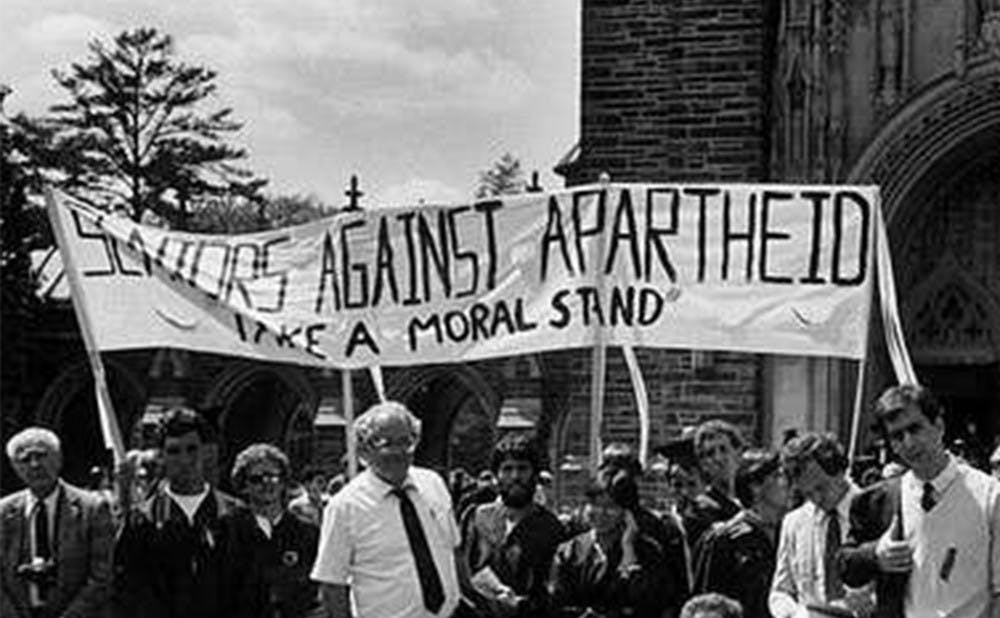The history of Duke student activism shows that highly intentional campaigns that are sustained over time and bring together coalitions have been successful in achieving goals.
Over the past half century, Duke students and faculty have founded successful movements which used different methods to create change on campus. In the 1980s, for example, Duke activists pursued an almost decade-long campaign against apartheid in South Africa, finally resulting in Duke’s divestment from its holdings in that country until 1994. In 2013, DukeOpen activists achieved some success in their push for increased endowment transparency. The similarities between these and other successful movements help to illustrate what makes a campaign most effective and show which elements of Duke student activism have changed over time.
“Ultimately, the day is won by the strength of arguments,” said Ron Grunwald, associate dean of the Trinity College of Arts and Sciences and Trinity '80. “This is a university community and in a university community, positions are won by the strength of arguments and not just by how loud you are or how creative your demonstrations are, although loud and creative demonstrations have a role and are important.”
An underlying theme in successful Duke activist movements is an explicit and realistic list of demands. Bobo Bose-Kolanu, a fourth-year Ph.D. student in literature and founder of DukeOpen, explained that researching the cause and formulating a specific policy recommendation was effective for his group.
Robert Korstad, professor of history and public policy and director of the Initiative on Poverty and Social Justice, also noted that having a clear goal is a consistent trait of successful campaigns, specifically the anti-apartheid campaign and the students against sweatshops campaign.
“There was an important moral and ethical issue at stake,” he said. “It was something that the University could do that was important, but didn't overturn the whole structure of the University.”
Effective Duke student activists are also able to understand the power and authority structures on campus. For the DukeOpen campaign, activists’ ability to navigate the paradigm of the administration and the Board of Trustees was key.
"Understanding all the different groups and stakeholders and how political capital is distributed and who influences who is really key to increasing pressure on the targeted decision-maker,” Bose-Kolanu explained. "You have to have this organized strategy for how to apply what tactics when, instead of just throwing everything at the wall and seeing what sticks."
Both Grunwald and Korstad also noted the importance of coalitions in successful past movements.
“They were built around coalitions. They weren't simply student-led,” Korstad said. “There was good student leadership, and there was good interaction among faculty and staff and students on these issues.”
One aspect of modern campaigns that is changing strategies, however, is social media. Bose-Kolanu explained that group messaging applications were essential in organizing DukeOpen, especially when information had to be spread to supporters immediately.
Over the years, student activist movements have dealt with a number of limitations. Bennett Carpenter, a graduate student in literature involved in the current campaign to eliminate continuation fees for graduate students, noted a few reasons for the difficulty in organizing students in Duke’s current activist climate.
“Students here seem incredibly preoccupied with their future,” Carpenter wrote in an email. “There is so much fear of personal, professional and financial failure—even among first-year undergraduates.”
Carpenter added that the University administration has a sophisticated public relations organization that can deflect criticism from activists.
Bose-Kolanu also noted the difficulty of beginning a campaign.
"I would say that the challenge for any successful movement...is to become a movement,” he said. “You have to transform social energy into social movement."
Grunwald explained that when legitimizing campaigns, activists cannot be merely reacting, but must also have a deeper persistence and understanding of the problem at hand.
“Inevitably, movements make demands,” he said. “Having the determination to follow something through depends on being motivated by something more than just reacting to a specific event or reacting to a specific circumstance. It really requires some kind of deep understanding and analysis.”
Correction: An earlier version of this article incorrectly stated that Bose-Kolanu was a master's student in computer science rather than a Ph.D. student in literature. The Chronicle regrets the error.
Get The Chronicle straight to your inbox
Signup for our weekly newsletter. Cancel at any time.
Class of 2019
Editor-in-chief 2017-18,
Local and national news department head 2016-17
Born in Hyderabad, India, Likhitha Butchireddygari moved to Baltimore at a young age. She is pursuing a Program II major entitled "Digital Democracy and Data" about the future of the American democracy.

